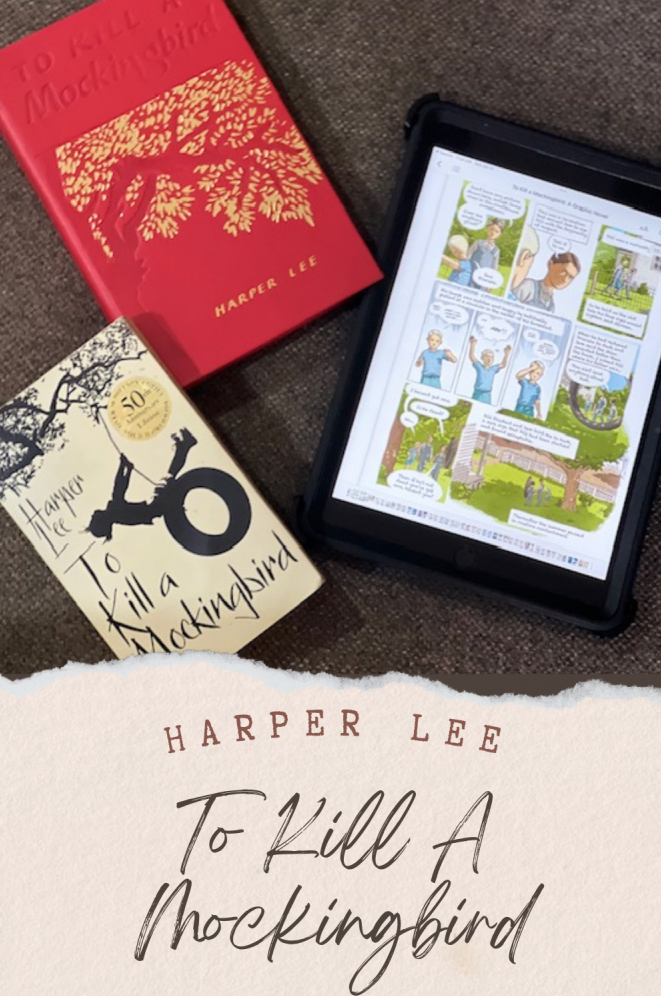I continue to face challenges in encouraging my dyslexic daughter to read. Imagine my joy when she picked up a graphic novel adaptation of my favorite book, “To Kill a Mockingbird”. It reignited my deep love for this novel and inspired me to write my first book review.
My high school experience was dotted with numerous literary adventures, but none struck a chord quite like Harper Lee’s ‘To Kill A Mockingbird.’ This book became more than an item on the syllabus; every turn of the page transported me deeper into the dusty streets of Maycomb, Alabama. This literary masterpiece remains a timeless beacon of courage, justice, and empathy; where innocence collided with prejudice, and where one man’s quiet heroism reverberates through the corridors of history.
Even years later, the story of Scout Finch and her father, Atticus, echoes deeply. It’s a narrative that doesn’t just belong to the past but continues to echo in the chambers of contemporary society. As I revisit the Finch family and their small town rocked by racial prejudice, it’s clear that the novel’s messages are as powerful and pertinent today as they were in the 1930s.
So, why should we return to this classic today? It’s simple. The story offers a mirror to our current world. Through Scout’s youthful gaze, we navigate a landscape that examines the core of human morality, tests the boundaries of empathy, and challenges us to consider the weight of justice.
The Enduring Themes of ‘To Kill A Mockingbird’
Harper Lee’s ‘To Kill A Mockingbird’ emerges not simply as a narrative but as a landscape of themes that transcend the passage of time. Each character is meticulously crafted to challenge our perceptions and stir our emotions. From the mysterious Boo Radley and the bravery of Jem Finch to the dignified Tom Robinson. I recall, quite vividly, being introduced to the depth of morality and the weight of compassion through the character of Atticus Finch maintaining integrity even when faced with the stark realities of a prejudiced community.
Lee does not merely tell a story; she invites us to confront the racial tensions that brew within the town of Maycomb—a reflection of the broader societal issues that are still achingly relevant. The charged trial of Tom Robinson, an African American man unjustly accused of a crime, lays bare the systemic injustice deeply ingrained in the setting of the 1930s South. Yet, the principle of ‘walking in someone else’s shoes’ as articulated by the wise-beyond-her-years Scout, offers timeless wisdom on empathy and understanding.
For educators and students alike, ‘To Kill A Mockingbird’ is more than a book; it is a medium through which the persistent shadows of racism and discrimination are explored. Reading and discussing this book in the modern climate rings a clear message: societal prejudices need to be acknowledged and addressed, an effort that is as necessary now as it has ever been.
What strikes me most, though, is how the novel effortlessly cultivates an internal dialogue among readers. It provokes us to examine our worldviews, instigating a heartfelt ponder on personal biases and ethical standpoints. This, coupled with the recognition of the bravery it takes to stand up against the tide, is perhaps why the book hasn’t just survived but flourished through the decades.
The Profound Impact and Legacy of Harper Lee’s Masterpiece

One can argue that the true greatness of a work of literature lies not just in its ability to tell a compelling story, but in its power to stir deep, lasting conversations long after the final page is turned. ‘To Kill A Mockingbird’ achieves this spectacularly, nurturing a legacy that transcends decades. The narrative is a vessel for introspection, urging readers to confront their convictions and consider the implications of their beliefs and actions.
My connection to the book extends beyond the print. It taught me vital life lessons in empathy and justice at a crucial developmental stage. Its influence stretches into adulthood, shaping my understanding of bravery and morality. Atticus Finch’s quiet heroism taught me that courage isn’t defined by physical prowess but by the strength of one’s convictions and the willingness to challenge prevailing norms.
Culturally, ‘To Kill A Mockingbird’ has taken on a life beyond its pages. In 1962, the novel’s film adaptation further ingrained its significance into American culture. Gregory Peck’s iconic portrayal of Atticus Finch brought Lee’s narrative to life, translating the quiet strength of the character to the screen and earning widespread acclaim.
It’s not just the accolades that measure the novel’s impact. It’s also about how it’s been embraced in classrooms and book clubs around the world, sparking conversations about difficult but essential topics. I do hope that education systems continue to value the text for its clear-eyed examination of racial injustice and the human condition.
Concluding Thoughts: Why ‘To Kill A Mockingmockingbird’ Remains Essential Reading
Reading ‘To Kill A Mockingbird’ is more than an act of leisure; it’s an educational journey that wields the power to shape worldviews. I’ve always believed this narrative goes beyond the simple categorization of a novel. It’s a piercing call to look inward and confront our deeply held prejudices.
To address the complexity of humanity with the clarity that Harper Lee does requires extraordinary literary prowess. Her characters, especially Atticus Finch, become moral compasses that guide readers through ethical and emotional mazes. Even after all these years, the messages ring clear: the importance of empathy, bravery, integrity, and the relentless pursuit of justice.
Harper Lee achieved something remarkable. She crafted a story that transcends time and generations. It serves as a protective beacon amid society’s often tumultuous waves of change. In classrooms, book clubs, or simply through personal reading, ‘To Kill A Mockingbird’ should spark conversations about how we treat each other and the kind of world we want to live in.
I sign off, urging anyone who hasn’t experienced the gripping tale of ‘To Kill A Mockingbird’ to pick up this book. Let the Finch family’s story challenge and change you. It’s a testament to literature’s enduring power to instill lessons of heart, courage, and change—a true classic.
Discover “To Kill A Mockingbird” at Bookshop.org or on Amazon in your preferred format: Kindle Version, Hard Copy, Graphic Novel, or Movie.
Disclosure: Please note that as an Amazon Associate, we will receive a commission for any purchase at no extra charge to you.
Please utilize the comment section below to share your thoughts and views.
Dee_J


I’m so glad to read your review. I, too, adore this book and wish Lee had written much more. It is a masterpiece I re-read every few years! And I also love the 1962 film with Gregory Peck. It’s so refreshing to find a literary website to critique. I’m having a good look around and have bookmarked your lovely site.
Mocking Bird also opened new morality to me as a teenager. For me, the literary style penetrates deep into my soul and changes my life repeatedly. I write in a literary style that few people seem able to embrace these days – 5 novels! Long live literature and writers who can stop your world for you!
I’ll be back!
Hi Linden.
I’m so glad that you stopped by. Mockingbird was one of those books that really hit me on the first read and it continues to be a favorite. It helped that my Literature teacher at the time made it real for us. This is my very first book review and I am thrilled that you enjoyed.
Stick around!
Dee_J.